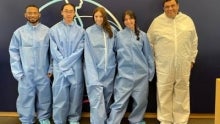RPI Alumnus Sheldon Weinbaum ’59 Named Recipient of National Medal of Science
The Future of AI Is Wide, Deep, and Large
Rensselaer Students Win National Competition for Heart Monitoring Device Design
NYT: How Technology Is Changing the Future of Higher Education
Another harbinger of things to come sits on a hillside near the Hudson River in upstate New York, where an immersion lab with 15-foot walls and a 360-degree projection system transports Rensselaer Polytechnic Institute language students to China, virtually.
CISL Holding a Virtual Information Session for Remote Fall 2020 URPs
In a collaboration between Rensselaer and IBM Research, the Cognitive and Immersive Systems Laboratory (CISL) invites students interested in conducting research with us to attend an information session Wednesday, August 12th @ 2 pm online. RSVP to Maura Marsett <saratm@rpi.edu> or register on Handshake by 9am Wednesday, August 12th for WebEx session information.
The research conducted at CISL is currently focused on the following projects:
CISL Holding Virtual Information Session for Remote 2020 Summer URPs
In a collaboration between Rensselaer and IBM Research, the Cognitive and Immersive Systems Laboratory (CISL) invites students interested in conducting research with us to attend an information session Thursday, April 30th @ 1:30 pm
HUMAINE 2020 Call for Participation
Covid-19 Update: Following the state and university guidelines, HUMAINE organizers have decided to host this year's competition online via a web browser instead of running it in the on-campus immersive environment. At some future date, if conditions safely permit, we may demonstrate some of the submitted agents in the immersive environment. This does not affect how participants write/submit their code for now.
Following ANAC guidance, we have extended our deadlines for participants to submit their code.
CISL Presents at the 178th Meeting of the Acoustical Society of America
Graduate Student Jerry Huang presents an ongoing CISL project at the 178th Meeting of the Acoustical Society of America in San Diego, California.
link to webcast of Jerry's presentation
CISL Hosts Roundtable Discussion at ACTFL 2019
Assistant Professor Helen (Yalun) Zhou and Research Specialist Jaimie Drozdal host a roundtable discussion on the Mandarin Project at the American Council on the Teaching of Foreign Languages (ACTFL) 2019 Convention in Washington, D.C.




